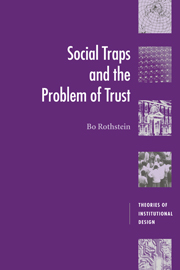Book contents
- Frontmatter
- Contents
- List of tables and figures
- Acknowledgements
- 1 Reflections after a long day in Moscow
- 2 On the rational choice of culture
- 3 On the theory and practice of social capital
- 4 Social capital in the social democratic welfare state
- 5 How is social capital produced?
- 6 The problem of institutional credibility
- 7 Trust and collective memories
- 8 The transition from mistrust to trust
- 9 The conditions of trust and the capacity for dialog
- Bibliography
- Index
7 - Trust and collective memories
Published online by Cambridge University Press: 22 September 2009
- Frontmatter
- Contents
- List of tables and figures
- Acknowledgements
- 1 Reflections after a long day in Moscow
- 2 On the rational choice of culture
- 3 On the theory and practice of social capital
- 4 Social capital in the social democratic welfare state
- 5 How is social capital produced?
- 6 The problem of institutional credibility
- 7 Trust and collective memories
- 8 The transition from mistrust to trust
- 9 The conditions of trust and the capacity for dialog
- Bibliography
- Index
Summary
We seem to have come to the end of the road in this analysis. We have our thesis about the importance of universal institutions, for which we have found reasonably good empirical support, but have thus far found no decent explanation of the genesis or survival of such institutions. On the contrary, the rationalist argument is that such institutions should be impossible and if, for reasons unknown, they are born despite their impossibility, they should soon be destroyed by economic and political opportunism. Political, economic, and other special interests will gradually undermine universal institutions, either by directly and formally replacing them with partisan institutions that favor the interests of a special group, or by corrupting them by informal means so that in reality they work in a partisan fashion. Thus, we cannot explain the wide variation in the occurrence of universal institutions either. The argument thus far is that absent the establishment of moral and ethical norms in defense of universal and impartial political institutions, social capital will wither and the risk that the social trap will close around us will flourish.
Whatever will be, will be … because it was like it was
If it is true that only moral and ethical acts can uphold universal institutions, those of a logical turn of mind must question whether the only reasonable explanation for the variation of corruption found among countries and societies is rooted in historically inherited culture.
- Type
- Chapter
- Information
- Social Traps and the Problem of Trust , pp. 148 - 166Publisher: Cambridge University PressPrint publication year: 2005

